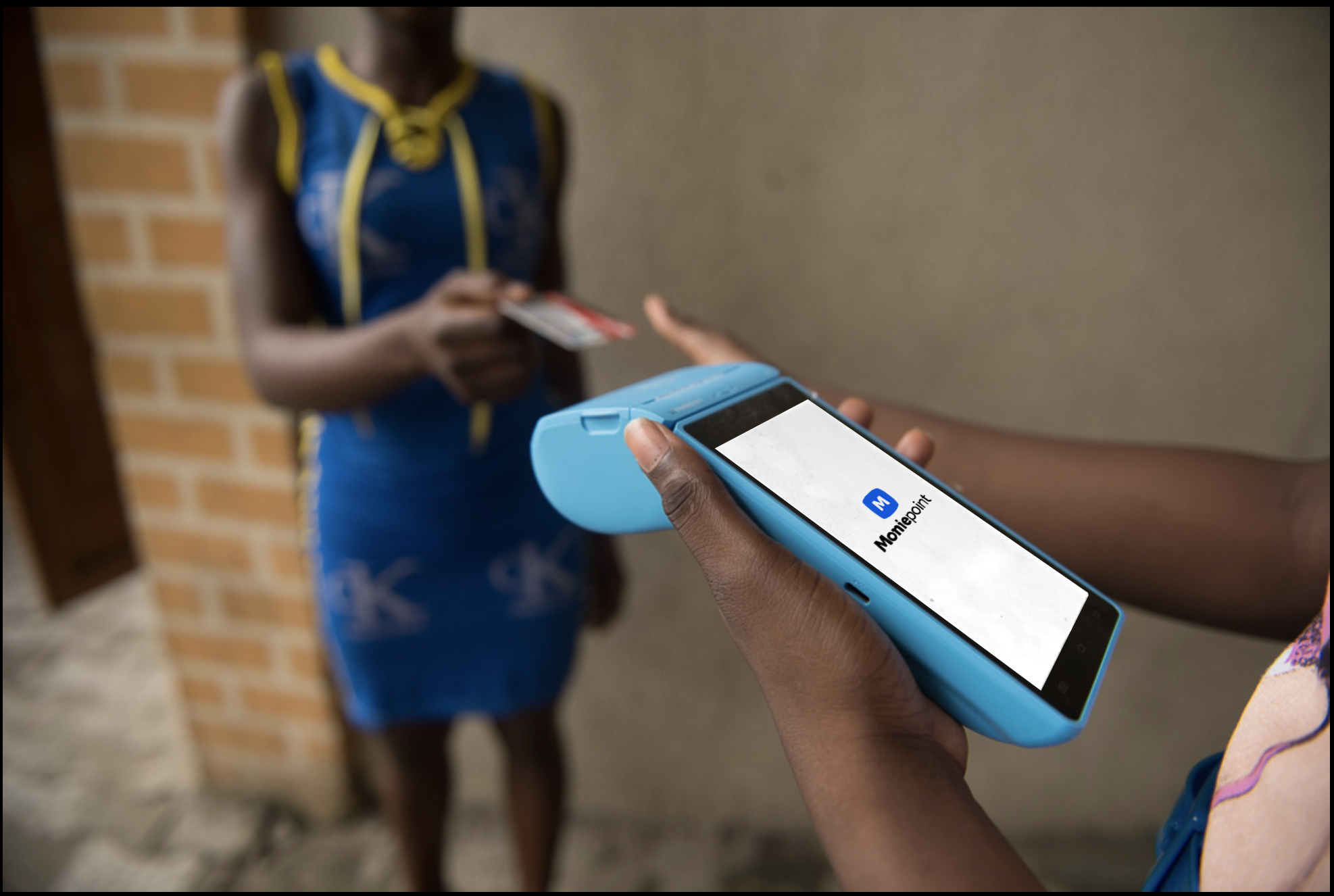Six years after TeamApt, a little-known banking software development company, had launched, it stirred excitement after Bloomberg reported the startup’s move to raise $150 million at a billion-dollar valuation—which would elevate it to the coveted unicorn status. TeamApt’s co-founders had bootstrapped the company from a four-man team in their flat in 1004 Estate to building products, MoneyTor and AptPay, which serviced virtually all the commercial banks in Nigeria. TeamApt followed the growth with a $5.5 million Series A round by 2019.
However, it was Moniepoint, the product it launched next, that skyrocketed the company to near-unicorn status.
According to the World Bank, Nigeria had 4.3 bank branches per 100,000 people in 2018, thereby leaving many of its 200 million population either unserved or underserved. Moniepoint provides payment, withdrawal, and deposit services to these underbanked users through an army of agents mostly in mom-and-pop stores across the country. In 2019, when OPay announced a total of $170 million in fundraising from two rounds and marched thousands of point-of-sale (POS) terminal-wielding footmen across the country to convert agents and successfully grow agency banking in the country, Moniepoint launched that September after a beta-testing phase, with about 1,000 agents.
“We didn’t have money then, so we were taking terminals from banks and manually sending them to agents, individually, in other parts of the country. That was so base and hectic,” says Tolu Adetuyi, Moniepoint Head of Growth.
After the $5.5 million raise, TeamApt had cash in the bank to place orders for terminals in China and invaded the Nigerian market. Now it processes over $4 billion monthly, servicing 18 million unique customers, and has over 120,000 active merchants in almost all of Nigeria’s 774 local government areas (LGAs)—only the terror-prone LGAs in the country’s northern regions are left out. A regulator report seen by TechCabal back in June capturing transaction volumes by super agents showed TeamApt recorded an agent transaction volume of roughly 50 million, which accounted for 75% of total agent volumes collated for the month reported. Although, an industry analyst under anonymity told TechCabal that he doubts OPay’s numbers were captured in the report.

So how did TeamApt become this super agent?
“Back then, our fee was only 1% of each transaction, which was high, but that was what we could afford, but we obsessed about our agents and offered them unmatched user experience,” Adetuyi explained.
Tolu Adetuyi, as growth lead, along with 40 other support staff, oversee a massive network of agents engaged through Whatsapp groups dedicated to each LGA in Nigeria and a few other separate high-level Whatsapp groups of LGA agent leaders also called cluster managers, state managers, and regional managers. These performing agents-turned-managers are responsible for increasing and engaging the agents in their communities in order to increase their commission.
“My phone is always buzzing, and I’m attending town hall meetings. That’s like, the whole of my work. I know what’s happening on the streets right from my room,” Adetuyi tells me excitedly via a Google Meet call.
TeamApt’s strong feedback loop facilitates rich market intelligence which enabled the company successively introduce groundbreaking features to the market which some competitors adopted and eventually became industry standards.
Mrs Ogunleye, an agent in the Alimosho local government area of Lagos, runs a grocery store and owns three POS terminals. “I started using Moniepoint because of their daily commission settlement while others were paying monthly,” she tells TechCabal.
Sources at TeamApt credit Moniepoint’s early success and breakthrough growth to this payment feature. “Many of these agents are like petty traders who need their daily earnings for restocking and running their households. I study my agents. I literally have documents on agent motivation,” Adetuyi shares.
MoniePoint also provides agents with live analytics dashboards to see a detailed breakdown of their performance and earnings. This transparency enables agent trust in the commission given and drives them to improve their performance as opposed to opaque estimated monthly earnings.
TeamApt deploys an interesting active POS terminal performance management system for its merchants. For example, for every 10 terminals given, a certain number must be doing transaction values exceeding a fixed amount. The figure is determined by the area and market trend. This drives cluster managers to identify and recruit the best agents and engage them daily to improve their performance.
“We don’t really want merchants who use our terminals only when they need to make quick money. We want active agents who use them daily. We try to prevent what they call bozo explosion, where we bring in lots of agents but are not able to service the 20% that’s going to give you most of your revenue, then you end up losing them,” Solomon Amadi, Vice President at TeamApt, tells TechCabal.
TeamApt’s agent network is a vibrant talent ecosystem that allows enterprising agents to grow through the rank. Merchant agents can become cluster managers at LG level, grow into state managers, and finally regional heads, while increasing their earnings along the way.
“It’s like a talent war. Competitors are calling and trying to poach our cluster managers, so much so that we know the name of some of the employees calling them because our cluster managers tell us. That’s why we sign exclusive contracts with some of these managers,” Amadi disclosed.
The talent grab, though, goes both ways. TeamApt also tries to convert performing agents on other platforms.
To improve the reliability of its product, TeamApt introduced to the market a 24-hour resolution service for false debit card withdrawals. Usually, it takes 8 days after physically visiting a bank branch to resolve an unsuccessful card withdrawal where the customer’s account got debited. But TeamApt funds customers from its account once it can verify the transaction and later sorts out the reconciliation at the back end with the bank.
“The solutions we introduced to the market seem commonplace but many of them weren’t being done till we did. In Nigeria, we just like to copy and paste models without thinking to adapt them to our peculiarities. But, first principles thinking has really helped us in how we approach problems and come up with the solutions we have introduced,” Adetuyi concludes.
“First principles thinking” is a phrase I heard often while interviewing management executives at TeamApt. It’s a problem-solving thought process of attacking problems by first identifying the fundamental issues. It was first taught by Aristotle and currently made popular by South African-born physics engineering genius, Elon Musk. Tosin Eniolorunda, founder and CEO of TeamApt, champions the thought process and is instilling it into the company culture.

“When we hit a roadblock while thinking up a solution, Felix (TeamApt CTO) would often say, okay, let’s go back, let’s go back,” Eniolorunda tells me as he rolls his wrist backwards. He shares that his exposure to first principles philosophy came in stages. The first time was in his 100 level at Obafemi Awolowo University (OAU) as a mechanical engineering student.
“I got into OAU on merit, first try. So, I was feeling fly with myself. But I now failed in my first year. My CGPA was 3.3,” he shares in-between laughs. “That was a major learning experience for me. I learnt the power of focus. Secondly, it sparked a new way of thinking because adversity changes us. I questioned myself on why I want excellence and I began to think of how to get there.”
Tosin, the first born of a building contractor father and primary teacher mother, worked and paid his way through tertiary school and graduated with a second class upper in mechanical engineering. He had always wanted to be an entrepreneur and build “something massive”. With TeamApt seemingly to be crowned with unicorn status, the company now has its eyes on digital banking but with a slant. “There’s a me too movement in tech. Everyone is launching digital banking with different offerings. But the fundamental question is, what do customers really need? Zero cost transaction accounts? That’s good, but I think credit is one of the key needs. So, we will be launching a hybrid credit-led banking solution that also caters to the offline market,” Eniolorunda concludes.















